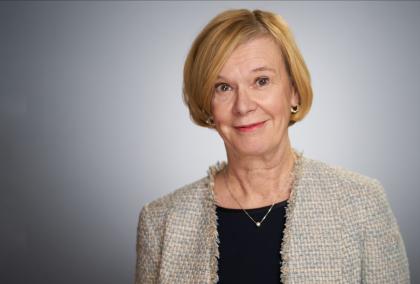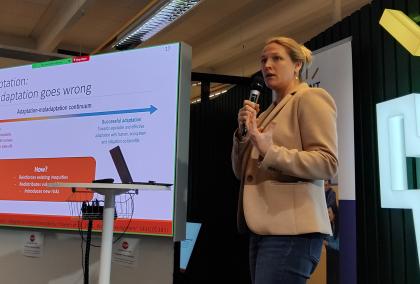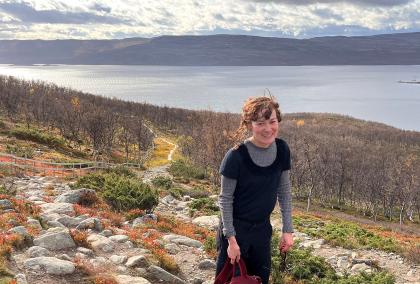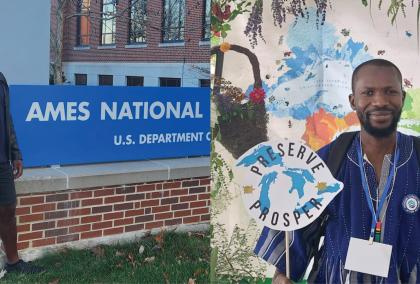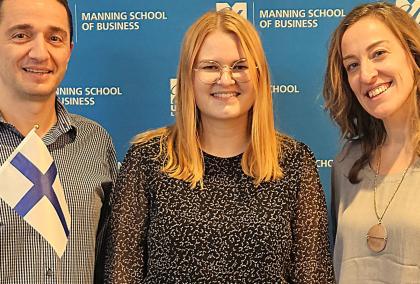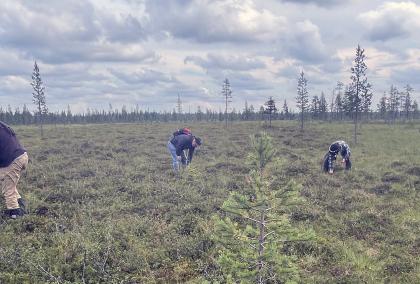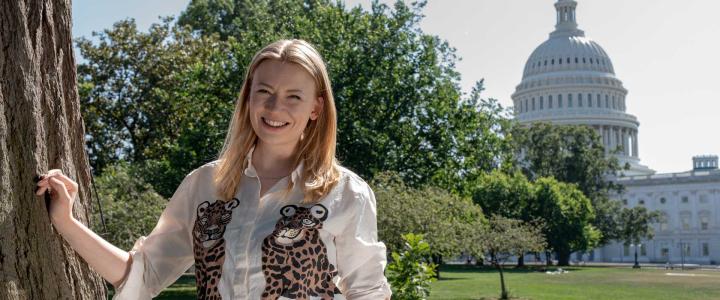

Iida Tikka was clear about her professional vocation at a very young age - “I decided when I was 12 that I wanted to be a journalist,” she says, but she couldn’t imagine then where that path would eventually lead her. From journalism student in Tampere to Russian correspondent in Moscow, and from Fulbright scholar at Georgetown to YLE’s Chief U.S. Correspondent based in Washington, Iida remains motivated above all by the responsibility of journalists to tell the truth and help to make a better world.
My purpose is to show that different human experiences are linked together in this inseparable way. One person’s fate somewhere, even on the other side of the world, is connected to our fate.
“I feel that my purpose is to show that different human experiences are linked together in this inseparable way. One person’s fate somewhere, even on the other side of the world, is connected to our fate. That seems very obvious right now when you think about the big topics of our time, like climate change. The work is never finished, it’s not done by one person, but by hundreds and thousands of journalists around the world all the time. And I see myself as one part of this giant machine that is trying to remind people about those connections.”
From Finland to Russia, and from Moscow to Georgetown
Iida made the unusual choice to learn Russian at school even before she started studying English, and first visited Moscow when she was in high school. “I knew I wanted to live there, because Moscow is such a fascinating city.”
During her undergraduate journalism degree, she attended Moscow’s Mgimo University as an exchange student. On completing her studies, she stayed on in the Russian capital as Russian correspondent for Finnish commercial broadcaster MTV and the Finnish News Agency STT. Her experiences, witnessing at first hand Russia’s moves towards war and invasion of Crimea in 2014, motivated her to deepen her knowledge through a security studies master’s degree.
“While I was in eastern Ukraine, I realized that the one thing I need to understand if I’m going to cover Russia is war, because it was so clear that it was going to go on for a long time, and was something that was so clearly going to shape the relationship between Russia and Europe in the future.”
“At that time, I was still hoping to work as a Moscow correspondent for most of my career or at least as a Russia-specialized journalist. I knew that I wanted to study security, and if there’s one place you want to study international security, it’s the U.S. It dominates the global security system and is such a deciding actor in most of the world’s conflicts and security issues.”
For Iida, the choice was clear: Georgetown in Washington D.C., which teaches one of the world’s best international security master’s programs. Iida secured a Fulbright scholarship which enabled her to join the prestigious program in 2018, specializing in energy security.
A Fulbright Journey with a 50-year History
“My first connection with the U.S. goes way beyond even my lifetime,” Iida says. Iida’s grandparents were in touch with an American family who had Finnish roots, and the two families enabled their children to visit each other’s countries, and develop life-long friendships in the process. “We consider one another family. Ken is my American grandfather, and his kids who visited Finland as teenagers are now my American aunts and uncles.” Iida and her siblings spent summers in the U.S., while their American “cousins” came to spend summers in Finland. Iida celebrates Thanksgiving and the 4th of July with her loved ones in Minnesota. “We all get along and love each other. "It’s been almost 50 years that our families have been connected.”
Some of those American aunts and uncles had directly benefited from Fulbright themselves, coming to Finland to study with Fulbright scholarships a generation previously.
“Fulbright was what I thought of first,” Iida says. In addition to financial support, the Fulbright Finland Foundation helped her navigate the U.S. university system and application procedures. “For a Finnish person, the U.S. system is very new. You need to learn how to write your application letter in a way that you don’t humble yourself too much. You need to show off a little so that you can actually get into the university!”
After finishing her studies in 2020, right in the middle of the COVID-19 global pandemic, Iida began work as U.S. correspondent for the Finnish public broadcaster YLE that August, just before the 2020 election.
For a Finnish person, the U.S. system is very new. You need to learn how to write your application letter in a way that you don’t humble yourself too much.
Bringing Knowledge Back Home Through Journalism
“My Fulbright journey has been very connected to this war that is still ongoing and is now defining so much of my work here.”
After studying at Georgetown, and for the first time in her life, Iida wondered for a moment whether she could pursue an alternative career to journalism. “I could see all the different possibilities opened by my degree. Some of my classmates are now diplomats, some of them work at the Pentagon. One of my really close friends is an expert in right wing radicalism in the U.S. They went to all these different fields, and I could have also gone into something else as well.”
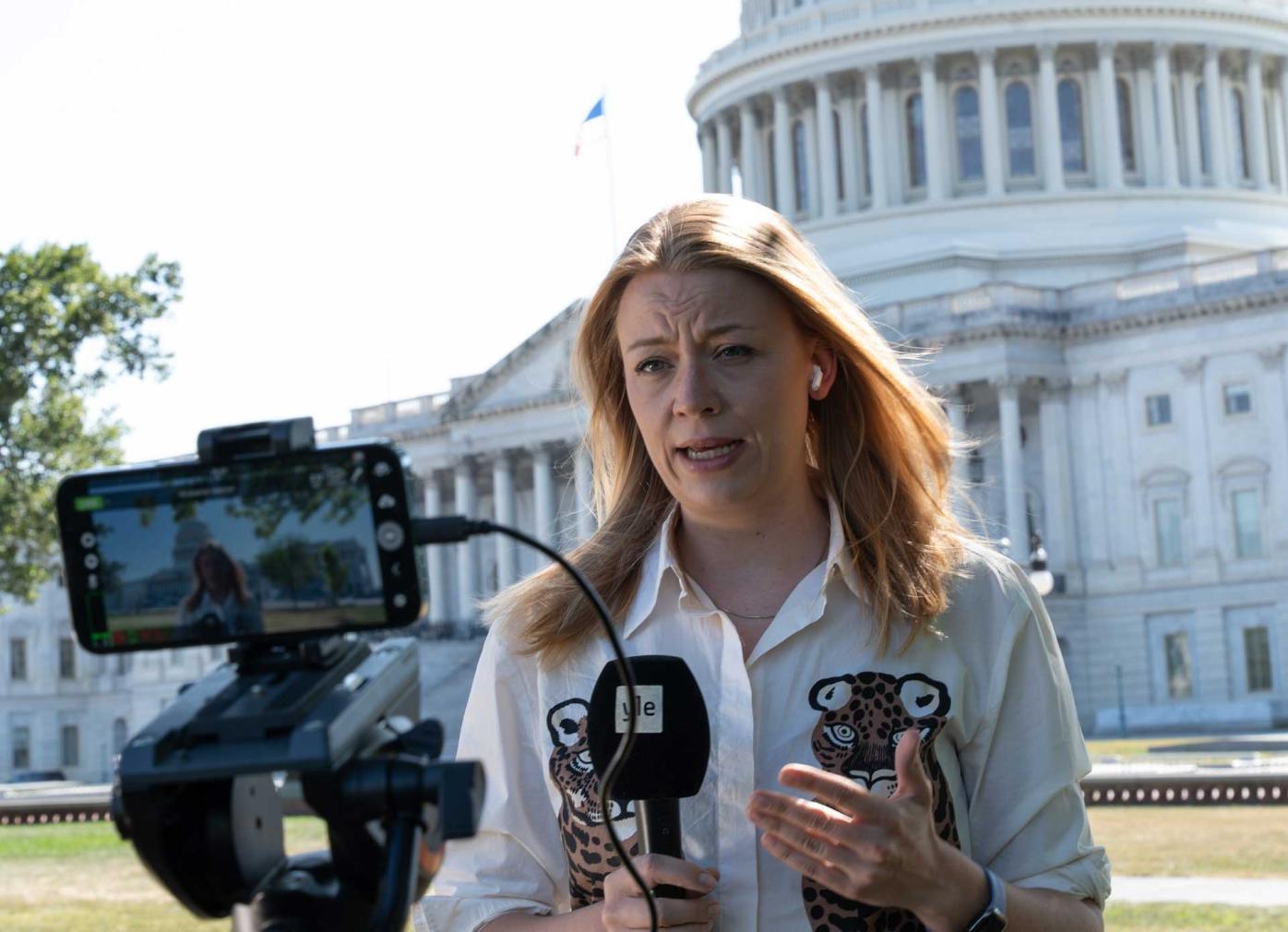
However, Iida saw her path clearly. “I did the master’s so that I could be a better journalist. So here I am, and I’m sure I will continue in journalism.”
“I like to think that I embody exactly what the Fulbright is meant for. My job is literally to inform the public, trying to create deeper knowledge of issues that are of importance for Finnish voters, especially in security issues. I’ve been here as a reporter while Finland had this quick turn towards NATO and so on. That was something I specialized in my studies in international security - and then here I am reporting on it.”
Iida explains that much of her journalistic work focuses on the U.S.’s role in international security, regarding the war in Ukraine and also what that means for the NATO security structure. “I report on what it would mean for Finland. So all of my knowledge that I gained in Georgetown and all of my understanding of how the American security apparatus thinks and acts has been directly put in use for the Finnish public.”
“So, even though I haven’t returned to Finland, I feel that I have brought my knowledge back to Finland in the way that Fulbright wishes returning students do.”
A Responsibility to Tell the Truth
“I’m a very value-driven person as a whole. I believe in justice. I believe in freedom of speech. I believe that individual rights need to be continuously protected. I feel that right now it needs to be said that democracy is under attack around the world, that freedom of speech is under attack. We live in a time of continuous change in the communications sphere,” Iida says.
In a time of “fake news,” manipulation, and misinformation, how does Iida see her role as a journalist?
“We have a responsibility to tell the truth as journalists, even when it feels almost uncomfortable to say it out loud. And one of those things that seems uncomfortable to say out loud is that the U.S. actually went through a coup attempt in 2021, that there was a president who tried to stay in power even after losing an election. That, to me, has been a defining event of my time as a U.S. correspondent, which began with an election that still, according to one ex-president, isn’t resolved.”
Currently, Iida is reporting on political maneuvers in Washington that could alter the federal election system. “It doesn’t seem likely, but if the Supreme Court rules one way, then different States would have quite free hands to decide how to run federal elections, which would mean there wouldn’t be similar voting rights for different Americans around the country, which is a huge deal.”
However, it’s a challenge to cover such “bureaucratic” stories in a way that will keep people engaged, Iida says. “It’s a really tough job right now, to cover something so complex and so alarming at the same time, in a way that people will pay attention to in the middle of a war in Europe and the climate crisis that’s getting more and more urgent. Food prices are soaring everywhere, and people have other things to think about than the attack against democracy in the U.S.”
The public on both sides of the Atlantic can experience news fatigue, Iida says. “But it’s my responsibility to report what is happening in those attacks against the very basic institutions that made democracy successful so far.”
A Unique Perspective on the U.S. and Washington
In her job, Iida covers all kinds of U.S. news, from economy and politics to society and culture. “I work in multiple mediums. I can be on air commenting on the news, but I also do video stories, radio stories, podcasts, web stories, you name it. We try to cover stories that are also wanted by Finnish audiences - for example, today I’m doing a story about tipping. And then tomorrow I might be reporting on the debt ceiling crisis. It changes every day, which is great. It keeps the job very interesting and I travel a lot.”
Iida estimates she has visited at least half of the states in the U.S. “I’ve been to places where I don’t think most Americans go as tourists. I feel that I do have this sense of the country that you can develop as an outsider with the privilege of having reasons to travel to the most random places.”
“Covering the U.S. is so interesting because it is such a diverse country with so many different opinions, and with still this feeling of individual actions mattering. When I was working as a Moscow correspondent, it got hard at one point to do the stories when so many Russians were losing hope of their actions mattering because the system is so crushing and so repressive. There was this cynicism about how much can change, especially among regular Russians.”
“While there is some cynicism in the U.S. too, it’s to a much lesser extent. People here know their agency and they want to change things. They are active in their communities or in politics. I feel there’s a certain core element to American thinking, that my actions also matter.”
“What I love about living in D.C. is that it’s a concentration of people who are extremely conscious of their agency in the world, they take it seriously and they work towards whatever their aim is. That’s what makes this city so amazing intellectually. I would say it feeds my brain so much, and that’s why I love being here. And I’m really lucky that Fulbright brought me here.”
Read the whole Fulbright Finland News 1/2023!
